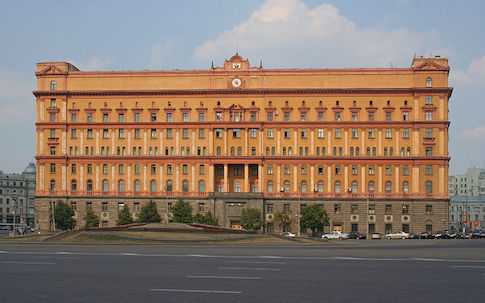The FSB, Russia’s internal security service, this month launched a series of raids on Turkish banks based in Moscow, according to at least one Russian media outlet citing the Turkish Hurriyet Daily News. The charges against the banks center on alleged money-laundering activities.
Bank spokesmen have dismissed the charges as another example of the Russian government’s efforts to intimidate and punish Turkish entities following the Turkish military’s Nov. 24 downing of a Russian Su-24 supersonic bomber, one of two aircraft that violated briefly and ignored multiple warnings to leave Turkish airspace.
Turkey operates five banks in Russia, including the state-owned Ziraat Bank and four private banks, Garanti Bank, Is Bank, Fiba Bank, and Yapi Kredi. Russian media also was reporting that as many as 20 Russian banks have been searched, also on suspicion of money laundering on behalf of various Turkish businesses.
Russian authorities seized no equipment or files at the banks according to the media reports, suggesting there was little to support the FSB’s money laundering charges. Instead, as one bank officer noted, "the aim is to disturb Turkish banks."
The FSB’s actions are the latest in a series of retaliatory actions promised by Russian President Vladimir Putin after the late November incident. Those actions were accompanied by a series of provocative statements from various Russian government officials, beginning with Putin’s characterization of the Turkish action as a "stab in the back by accomplices of terrorists."
Putin imposed sanctions that include a ban on hiring Turkish nationals, a ban on charter flights to Turkey, suspension of visa-free travel between the two nations, and a ban on various imports, including fruit, vegetables, poultry, and salt.
However, until the FSB raid Russian authorities had not imposed any sanctions on the banking sector or tried to use heavy-handed tactics against Turkish banks. The Russian government has yet to comment on the FSB actions or whether there will be any follow-up actions such as the arrest or detention of senior Turkish bank officials working in Russia.
Such moves would not be unprecedented. The Kremlin may be assessing its future options carefully as sanctions, such as what the Russians imposed on the European Union (EU) in retaliation against the EU sanctions imposed after the early 2014 annexation of Crimea, can boomerang against the country imposing sanctions. On that occasion the Russians banned import of popular food stuffs from the EU, including meats, cheese and wine. Those bans resulted in higher food prices given the relative scarcity of many of those items in Russia.
It is unclear how or when Putin will reduce pressure on Turkey. Andrei Karlov, Russian ambassador to Turkey, said relations between the two nations would be much improved if Turkey agreed to three conditions: an apology, prosecution of those involved in the downing the SU-24, and payment of an unspecified amount of compensation.
The Turkish government has apologized for the incident but has not commented on the other two conditions suggested by Karlov.
